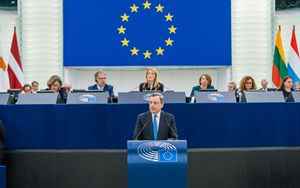(Finance) – “Our government was born as an ecological government, it makes the climate and the digital transition its most important pillars. The environment minister was extraordinary, he made extraordinary measures. But we can disagree on everything . We do not agree on the validity of the Superbonus 110%. I cite an example: the cost of improving efficiency has more than tripled thanks to the 110% measures, the prices of the investments necessary for the restructuring have more than tripled because 110% in itself takes away the incentive to negotiate on the price. Then, things go on in Parliament, the government has done what it could and our minister is very good. “This is what the Prime Minister Mario Draghi in its reply to the European Parliament in Strasbourg.
The Five Stars have lashed out against the premier’s words. “I would like to remind our Prime Minister that the Superbonus is an expression of the parliamentary will of all political forces, and for this reason, – underlined the M5S deputy Riccardo Fraccaro – even if his personal opinion is negative, he cannot boycott a measure that has received praise from the European Union on several occasions “.
Criticisms also come from Confedilizia. “The Prime Minister said today that he is opposed to the 110 percent Superbonus for seismic improvement and energy saving interventions in buildings, as it is a harbinger of price increases. The problem reported by the premier exists, even if the increase in prices has been determined by many factors but what is perplexing is the fact that the Government, unable to block this measure as it was desired by almost all of the Parliament, has introduced evident obstacles to its concrete application in recent months, in particular through the limits imposed on the assignment of credit – said the president of Confedilizia, Giorgio Spaziani Testa -. This way of proceeding, in addition to not being distinguished by transparency, has produced two very negative consequences: the first was that of putting into extreme difficulty, in some cases even in crisis, companies, professionals and owners who had the construction sites open; the second was to block the use of all the other incentives for building interventions, for which the credit transfer mechanism and invoice discount also allowed for application by low-medium income citizens “.
